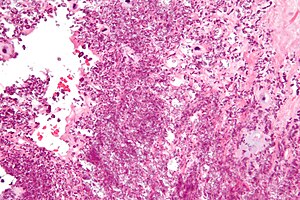Chondrocalcinosis
Jump to navigation
Jump to search
Chondrocalcinosis, also calcium pyrophosphate deposition and calcium pyrophosphate dihydrate deposition disease (abbreviated CPPD),[1] is a benign condition of the joints.
| Chondrocalcinosis | |
|---|---|
| Diagnosis in short | |
 Chondrocalcinosis. H&E stain. | |
|
| |
| Synonyms | calcium pyrophosphate dihydrate deposition disease, calcium pyrophosphate deposition, pseudogout (old term) |
|
| |
| LM | crystals with a rhomboid-shape; polarized light: positively birefringent, blue when aligned |
| LM DDx | benign calcifications, osteoarthritis |
| Gross | +/-subchondral cysts, degeneration of cartilage |
| Site | joints - especially knee |
|
| |
| Symptoms | joint pain |
| Prevalence | uncommon |
| Radiology | +/-loose bodies, joint space narrowing, narrowing of patellofemoral joint |
| Prognosis | benign |
| Clin. DDx | osteoarthritis, other types of arthritis |
It was previously known as pseudogout.[2]
General
- Classically found in the knee.
- Associated with low bone mineral density and vascular calcification.[3]
Gross
- Degeneration of cartilage.
- Subchondral sclerosis.
Radiology
- Similar to osteoarthritis - joint space narrowing & subchondral sclerosis.[4]
Findings suggestive of CPPD:[4]
- Subchondral cysts (large) - important.
- Intra-articular bodies, several.
- Increased narrowing of patellofemoral joint.
Microscopic
Features:
- Crystals with a rhomboid-shape.
- Positively birefringent, blue when aligned.
Notes:
- Memory device: ABC+ = aligned blue is calcium & cuboid - positively birefringent.
Images
www:
Sign-out
KNEE - BONE AND SOFT TISSUE, RIGHT, KNEE ARTHROPLASTY: - DEGENERATIVE JOINT DISEASE WITH SYNOVIAL HYPERPLASIA AND NO SIGNIFICANT INFLAMMATION. - CRYSTALLINE DEPOSITS CONSISTENT WITH PSEUDOGOUT. - BONE WITH THIN TRABECULAE.
BONE, LEFT KNEE, JOINT REPLACEMENT: - DEGENERATIVE JOINT DISEASE. - CRYSTALS CONSISTENT WITH PSEUDOGOUT. - SYNOVIAL HYPERPLASIA WITH RARE GIANT CELLS. - NEGATIVE FOR MALIGNANCY.
FEMORAL HEAD AND JOINT CAPSULE, LEFT, HIP ARTHROPLASTY: - DEGENERATIVE JOINT DISEASE WITH MILD LYMPHOPLASMACYTIC INFLAMMATION. - CRYSTALLINE DEPOSITS CONSISTENT WITH CHONDROCALCINOSIS. - NEGATIVE FOR MALIGNANCY.
Micro
The soft tissue section shows readily apparent rhomboid-shaped crystalline deposits (compatible with pseudogout). The crystals polarize and have a light blue hue under polarized light. Synovial hyperplasia is present. No lymphoid aggregates are apparent.
The bony section show thin bony trabeculae and cartilage with degenerative changes (surface fibrillation, thinning).
See also
References
- ↑ URL: http://www.ncbi.nlm.nih.gov/pubmedhealth/PMH0001458/. Accessed on: 28 October 2011.
- ↑ URL: http://www.rheumatology.org/practice/clinical/patients/diseases_and_conditions/pseudogout.asp. Accessed on: 12 March 2014.
- ↑ Abhishek, A.; Doherty, S.; Maciewicz, R.; Muir, K.; Zhang, W.; Doherty, M. (Aug 2013). "Association between low cortical bone mineral density, soft-tissue calcification, vascular calcification and chondrocalcinosis: a case-control study.". Ann Rheum Dis. doi:10.1136/annrheumdis-2013-203400. PMID 23912799.
- ↑ 4.0 4.1 URL: http://www.learningradiology.com/archives04/COW%20102-CPPD/cppdcorrectpage.htm. Accessed on: 9 October 2013.
- ↑ Dieppe, P.; Swan, A. (May 1999). "Identification of crystals in synovial fluid.". Ann Rheum Dis 58 (5): 261-3. PMC 1752883. PMID 10225806. https://www.ncbi.nlm.nih.gov/pmc/articles/PMC1752883/.